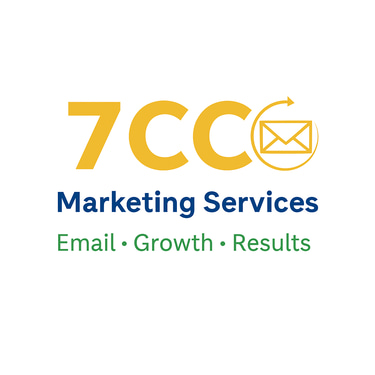TAILORED MARKETING SOLUTIONS. DATA-DRIVEN GROWTH
The Email Marketing Funnel: What It Is and Why Your Store Needs One
Not sure how email marketing funnels work—or why your e-commerce brand needs one? This guide breaks down the 3 key stages of a high-converting funnel (TOFU, MOFU, BOFU), explains why they matter, and shows you how to build your own step-by-step. Learn how to turn subscribers into loyal, repeat customers with a strategic email system that works while you sleep.
7CC Marketing Services
7/26/20252 min read


Introduction
If you’re sending email blasts without a clear strategy, you’re leaving money on the table. Your emails might be landing in inboxes, but are they guiding your customers to take action? That’s where the email marketing funnel comes in.
In this article, we’ll break down exactly what an email funnel is, why every e-commerce brand needs one, and how to build a simple, effective funnel that turns subscribers into loyal customers.
What Is an Email Marketing Funnel?
An email marketing funnel is a structured series of emails that guide a potential customer through different stages of their buying journey—from first discovering your brand to becoming a loyal repeat buyer.
Think of it as a digital sales assistant that works 24/7 to:
Educate your audience
Nurture trust
Overcome objections
Prompt conversions
Instead of sending random emails, a funnel delivers the right message at the right time to the right person.
The 3 Key Stages of an Email Funnel
1. TOFU – Top of Funnel (Awareness & List Building)
This is where your audience first encounters your brand. Your goal here is to attract attention and get permission to stay in touch.
Email Examples:
Welcome email series
Lead magnet delivery (e.g., discount code or free guide)
Brand introduction and values
Goal: Make a great first impression and give subscribers a reason to stick around.
2. MOFU – Middle of Funnel (Engagement & Education)
Now that they know who you are, it’s time to deepen the relationship. In this stage, you're providing value, answering questions, and building trust.
Email Examples:
Product education and benefits
Social proof: customer reviews and testimonials
How-to content or style guides
Behind-the-scenes or founder stories.
Goal: Help them consider your brand as the solution to their problem or need.
3. BOFU – Bottom of Funnel (Conversion & Retention)
This is where the magic happens—sales and loyalty. You target ready-to-buy subscribers and keep your customers engaged even after they purchase.
Email Examples:
Abandoned cart reminders
Flash sales or time-limited offers
Post-purchase follow-up
Loyalty program invitations
Replenishment reminders or product recommendations
Goal: Convert interest into action—and turn one-time buyers into repeat customers.
Why Your Store Needs an Email Funnel
Here’s why having an email marketing funnel is non-negotiable for e-commerce brands:
✅ Boosts conversions — Emails are personalized and timed to nudge subscribers toward purchase
✅ Reduces reliance on ads — Once set up, email funnels work in the background
✅ Increases lifetime value (LTV) — Keeps customers engaged after the first sale
✅ Delivers better customer experience — Helps your audience feel seen, heard, and valued
✅ Improves retention — With smart post-purchase emails, customers keep coming back
Common Mistakes to Avoid
Avoid these pitfalls when building your funnel:
❌ Sending the same message to everyone (no segmentation)
❌ Going for the hard sell too early
❌ Neglecting post-purchase follow-ups
❌ Ignoring mobile optimization (over 50% of emails are opened on mobile!)
❌ Not tracking performance metrics (open rate, CTR, revenue per email)
How to Get Started with Your Email Funnel
Getting started doesn’t have to be complicated. Here’s how to build your first funnel:
Choose an email platform – Tools like Klaviyo, Mailchimp, or Omnisend are great for e-commerce.
Map out your customer journey – Identify the key points where you want to engage with your customers via email.
Set up 3–5 core automations:
Welcome Series
Abandoned Cart
Post-Purchase Sequence
Win-back Campaign
Product Recommendation Flow
Write emails that match each stage.
Test, track, and optimize
Final Thoughts
An email funnel is more than a marketing tool—it’s your silent sales engine. When done right, it builds trust, drives conversions, and keeps your brand top of mind long after that first visit.
Let's build something that grows
STAY IN THE LOOP
growth@7ccmarketing.site
© 2025. All rights reserved.
Follow us on our socials
Subscribe to our newsletter for marketing tips, exclusive offers, and actionable insights—straight to your inbox.
